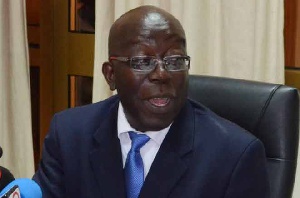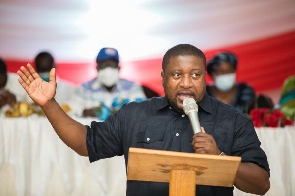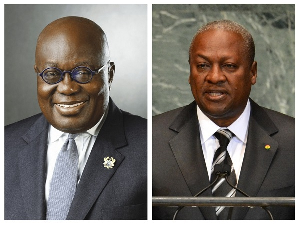 Director General, Dr John Ofori-Tenkonrang
Director General, Dr John Ofori-Tenkonrang
The national insurer has been in the news for several reasons in the past couple of years: reason which inspire hope and those that spell doom.
A 70 million dollar IT system procured with a department headed by a fake doctorate holder, to accusation of $ 500 thousand spent on audit of the previous administrations work amongst others, with the recent being the labour unions accusing the scheme of paying wrong premium to its members.
SSNIT has also been criticized for wrong investments and administrative cost that some believe are too high.
But in all these, managers of SSNIT, led by its Director General, Dr. John Ofori Tenkorang have defended the decisions made by his administration so far.
The managers say, their prudent management of the insurances of its contributors is the reason the Trust is able to pay claims despite the shortfall; the trust in two of the past three years has seen disbursements outstriping collections.
Banking sector cleanup and SSNIT Investments and Savings
The managers of SSNIT say, the trust insurer was not affected by the banking sector cleanup that led to the collapse and merger of some banks and a downgrading of one.
SSNIT is a key player in the financial sector with several investments in local and foreign banks holding different number of shares.
It has about 32% of its investment portfolio, close to GH¢3 billion in the financial sector.
In 2018, in the lead up for banks to meet the 400 million minimum capital requirements, SSNIT bemoaned the lack of dividend by most banks it had investments in.
Dr John Ofori-Tenkorang at the time said, “some of the banks have not paid dividends because of the minimum capital requirement. So a lot of them have taken part of their earned income and used it to capitalize. So some of the banks haven’t paid us dividends but we understand where the money is going”.
Deputy Director in charge of Finance and Administration, Michael Addo, said the trust was not affected because of prudent financial and accounting practices. He said SSNIT has over the period demanded all monies they had with banks had security; monies were not only deposited at treasury rate but came with 300 basis points and were also collateralized.
Michael Addo added the trust got its entire money back from the collapsed banks SSNIT banked with.
“… those who went down, we had security to the extent that we were even told hold on, do not exercise your security…so in three weeks, we sorted everything out”, he said.
Management also indicated that though the job losses in the financial sector did affect the number of contributors to the scheme, the numbers compared to its current 1.53 million-contributor roll was insignificant.
SSNIT System and Fake Certificates
Management of SSNIT says it is limping through the infamous Operational Business Suite (OBS) system. The system was procured under the tenure of Ernest Thompson and cost SSNIT over $70 million .
The case is currently in court. Though management say the system is not working perfectly, they are managing with it all the same.
The issues of the OBS system brought to the fore the qualification of the IT officer and other staff member.
SSNIT has since terminated the employment of 9 staff over fake certificates. EOCO has had the culprits handed over to them to be investigated over the criminal aspect.
The Director General, Dr John Ofori-Tenkonrang, said it was revealed during investigations into fake certificates at SSNIT that there was a criminal syndicate at Dansoman, a suburb of Accra that had the logo of almost all the universities and could print any degree certificate one opted for. They also discovered a worker at SSNIT who could hack into IT systems at the universities to change results.
These happenings at the Trust necessitated an audit into the activities of the past administration and cost it some GH¢500 thousand, contrary to reports that suggested the audit cost 500 thousand dollars.
Contributions, Pensions and Benefits
The Trust currently has some 1.53 million contributors, according the fund managers with a contributor to pensioner ratio at 8:1 at the end of 2018.
The 8:1 ratio, though not the most ideal situation as the trust managers have alluded to, is sustainable, all things being equal.
The Trust has also seen an increase in compliance; collecting some GHC 418 million more in 2018 than 2017, where a total of GH¢2.3 billion was collected.
The trust also recorded a 14% increase in contributions from active establishments, these successes attributed to several interventions initiated by the current administration.
The scheme, despite meeting its obligations by paying pensions and benefits, it has in the past two of three years seen expenses outstrips revenue.
Despite this current challenge requiring the Trust to dip its hands into its surpluses to pay off benefits (which has not really been the case over the past decade yet a worrying trend), it early this year announced an 11% increment in pension for 2019. This increment is expected to cost SSNIT over GH¢200million.
Summary of Financial Position of SSNIT
Total revenue for 2015 was GH¢2,333,256,000 against an expenditure of GH¢1,620,523,000. In 2016 total revenue slipped 15% to GH¢1,965,725, while expenditure increased by 44% to GH¢2,330,202,000 In 2017, total revenue appreciated by 52% to GH¢2,990,836,000 against an expenditure that went up by 12% to GH¢2,619,154,000. However, in 2018, there was a decline in total revenue by 11% to GH¢2,639,497,000, against a total expenditure that increased by 13% over the previous year to GH¢2,962,521.000.
Total Net Assets for 2015 was GH¢8.810 billion. In 2016, this figure decreased by 5% to GH¢8.405 billion whilst in 2017, it increased by 13% to GH¢9.518 billion. In 2018, Net Assets decreased by 3% to GH¢9.187 billion.










